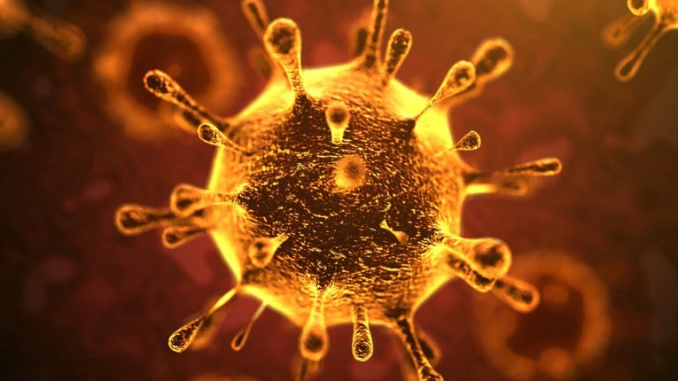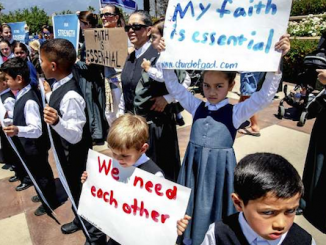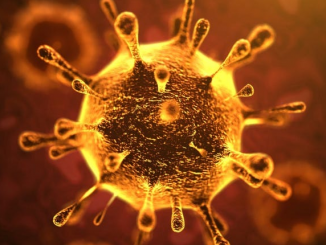
A new Johns Hopkins University study finds lockdowns only prevented 0.2% of Covid-19 deaths and were “not an effective way of reducing mortality rates during a pandemic.”
“We find no evidence that lockdowns, school closures, border closures and limiting gatherings have had a noticeable effect on Covid-19 mortality,” said the study, which is based on a review of 34 pre-existing Covid-19 studies.
Given the “devastating effects” that lockdowns have caused — the permanent closure of businesses, the loss of jobs and livelihoods, the year-long setback in educational growth for youth — the authors recommended that in the future they be “rejected out of hand as a pandemic policy instrument.”
Why not trust the people?
The authors of the study said that policymakers could have just trusted people to act rationally and responsibly and take precautions without any mandates, and the death rates would have been nearly the same.
“In the early stages of a pandemic, before the arrival of vaccines and new treatments, a society can respond in two ways: mandated behavioral changes or voluntary behavioral changes,” the paper said. “Our study fails to demonstrate significant positive effects of mandated behavioral changes (lockdowns). This should draw our focus to the role of voluntary behavioral changes.”
Santa Clara County was the first county to institute a lockdown in the U.S.
Benefits of lockdowns
While studies of specific measures like school lockdowns or border closures were somewhat inconclusive, there was “no broad-based evidence” in favor. Forced closures of businesses may have been beneficial for mortality rates, probably because they forced bars and restaurants to shut down.
Jennifer Grant, an infectious diseases physician at the University of British Columbia, said that focusing only on mortality is a “crude” measure. “There are other elements of lockdown that should be considered … hospital overload and general burden of disease, including the need for hospitalization in those who fall ill and long-term consequences for the infected,” she said.
Nevertheless, Grant has been a critic of lockdown measures in part because they impact whole segments of the population who were at low risk to begin with.
Here’s a link to the study.




Well, your “new Johns Hopkins University study” is non-peer reviewed “working paper” written by a Professor of Applied Economics, who is also a Senior Fellow at the Cato Institute.
Probably not a good idea to take medical advice from a conservative libertarian economist.
So Joe, the data doesn’t matter? The only thing that matters is that the scientists are deemed by you to be conservatives. And I guess anyone who disagrees with you is a conservative?
Stanford put out a study with similar finding, and just to make you feel better, it’s peer reviewed. https://padailypost.com/2021/01/18/stanford-study-lockdowns-have-no-clear-benefit/
You pro-lockdown people, you need to “follow the science”!
The article lacks important context and it’s not a medical study. Same with the Stanford study. This is a fundamentally misleading story to the point of providing misinformation.
Forbes isn’t a liberal publication. They say it’s junk too!
https://www.forbes.com/sites/brucelee/2022/02/06/did-so-called-johns-hopkins-study-really-show-lockdowns-were-ineffective-against-covid-19/?sh=468c41c01225
The Post needs to do a better job here.
Joe, read the story again. In the second paragraph it says: “… the study, which is based on a review of 34 pre-existing Covid-19 studies.”
I know “misinformation” is the new liberal buzz word these days, but I think they disclosed the nature of the study. You just decided to ignore it — or you didn’t read it — because it refutes your unscientific opinions.
You need to do a better job here, the Post was clear in what it wrote.
The “study” was from economists not epidemiologist or science/medical professionals and hasn’t even been peer reviewed. Doesn’t hold any weight but it does possibly confirm your bias.
Trey, I don’t think anybody was claiming this study was done by epidemiologists or others in the medical profession. That’s just a red herring you made up. Why don’t you read the study and debate the actual research?
BTW, why would you think an epidemiologist should be doing economic research?
Joe, are you a government employee?
So because this piece doesn’t align with your socialist political beliefs you automatically dismiss it? Get a grip. To those saying “this isn’t a John’s Hopkins study”… a) you really think this wasn’t first reviewed by a board prior to publishing, and b) I’ve never once heard any mainstream media outlet introduce a study with saying “this research is not associated with the institution itself.” The hypocrisy.
I can see how a study could accurately prove lockdowns didn’t prevent loss of life, but how can a study prove that “x” amount of lives would’ve forsure been lost without lockdowns….? One is a studying stating using data after the fact, while the latter could only be a projection model. There’s no way to accurately figure out how many people could’ve died as there are too many variables among individuals.
Just reread what I said and think about it.
This article is misleading because the study is not commissioned by Johns Hopkins University. The paper has 3 authors, one is a Johns Hopkins professor of Economics. The other authors are not JHU faculty. The article makes the faulty leap that it’s a Johns Hopkins paper over the mere instance that one of the authors works there It’s exploiting the Hopkins name and prestige in medicine to create the false impression that the paper has institutional legitimacy when in fact it doesn’t. In addition it is a working paper that has not been peer reviewed. Hopkins does not furnish non-peer reviewed information to the public in this manner.
Martin,
I’m looking at the cover of the study right now and in the bottom left hand corner is the emblem of Johns Hopkins University and to the right it says “Johns Hopkins Institute for Applied Economics, Global Health, and the Study of Business Enterprise.”
The next page says the study was under the direction of Johns Hopkins Prof. Steve H. Hanke.
Martin also falsely claims, “Hopkins does not furnish non-peer reviewed information to the public in this manner.”
Wrong. How do you think a paper gets to be peer reviewed without it being distributed?
Martin, you’re about as dishonest as they come.
Moderator, please take down Martin’s misinformation.
Impossible to prove!
Ah, the famous Imperial College of London study, which has been debunked so many different times and different ways it’s a joke. Scientists who once cited it don’t talk about it anymore.
That study is based on computer simulations by Neil Ferguson. Remember him? He was the guy who said in 2001 that mad cow disease would kill up to 136,000 people. The actual death toll was 178. Oops!
He also blew projections for mad sheep disease, avian flu and swine flu.
When Imperial College put out its paper showing death projections using Ferguson’s model, other scientists asked to see their model. They refused. What assumptions went into the model’s design? Again, they refused to say. Was the model updated with the best available evidence? Again, no answer. Then Ferguson resigned for violating the British lockdown rules he had a hand in influencing. A French Laundry moment, I guess.
Then the authors of the Imperial College paper retracted the study. They wrote: “Our manuscript was based on surveillance cases of COVID-19 identified before January 26, 2020. As of February 20, 2020, the total number of confirmed cases in mainland China has reached 18 times of the number in our manuscript. While the methods and the main conclusions in our original analyses remain solid, we decided to withdraw this preprint for the time being, and will replace it with a more up-to-date version shortly.”
Doesn’t sound like the best document to use for making important decisions about the lives of Americans.
You do notice that “Joe” along with other crazies never have good answers?? We’ve watched insanity is what we’re watching!!
I can see somebody saying, “0.2% is enough to lockdown everything in society, regardless of how many businesses are closed or how badly we disturb the education of our children.” Ridiculous!
You’re right!! Even tho they’re NOT taking inconsideration the suicides, over-doses etc etc that have happened for the .02%!! These liberal nut jobs are still trying to convince us mask and the jab work!! Please someone stop the insanity!! These people watch CNN, MSNBC, NBC etc etc and for these people them people are their God in what they say!! Just like Pigloosi telling us to “watch our carbon footprint” but she and other people fly solo on private jets! Have NO problem with the rich just do NOT preach to me about my “footprint” when you have 5 houses and fly in private jets
Funny how Johns Hopkins in Baltimore was regarded as a typical far-left academic institution. Then they print a study that challenges Dr. Fauci, and all of a sudden they’re branded a “conservative libertarian” outfit. LOL!
Our city and county officials blew it. The lockdown was unnecessary. The mask mandates were overreach. We should have isolated the vulnerable and let everyone else go about their business. The Johns Hopkins paper points out that they imposed restrictions that didn’t even work in the flu outbreak of 1918. Why do something that failed in the past?
The restrictions imposed in 1918 were extremely mild compared to the present lockdowns. There were no business shutdowns during Spanish flu and very limited (and failed) masking policies in a handful of places for short time. Failed then, failed now, with disastrous consequences in lost jobs, physical and mental health, and especially long-term harm to younger generations whose impact will be felt for decades. I am not convinced that the restrictions saved any lives but for sure cost many more and negatively impacted billions world-wide, including starvation. Increase in poverty alone reduces life expectancy. Expect major contraction to the economy in coming years, which directly impacts health and wellbeing.
I disagree that we should have isolated the vulnerable. There’s no practical way of isolating anyone from an airborne virus and when you isolate people, mental and physical health are impacted as well. Better to let individuals take whatever risk they deem appropriate. Government one-size-fits-all central planning should never be attempted again.
You do realize that London in the UK was one of the first places to stop the lockdowns, mandates, and vaccine passports? Also, the person who conducted this same study(Dr Bhatt)also claimed that the vaccine would stop you from spreading or catching the virus, which we all know now is not the case. Even the pharmaceutical companies admit this now and have clearly stated that they never claimed their vaccine would stop the spread or transmission of SarsCoV2, they only said it would help people have a better chance of surviving. It was a lie spread by politicians. Are you also aware that the human body is much more susceptible to infection when your blood oxygen is below 94% and the lower it gets the worse it gets? Masks do exactly that and so their effectiveness is even in doubt now. Fauci got this dead wrong and so did Trump and Biden for that matter, it is time we start admitting that because you people that have been about follow the science only seem to be that way when it agrees with your political views
Correct!
The Johns Hopkins researchers — who deal in the field of economics, rather than medicine or public health — did no independent research, but instead originally identified 18,590 global studies into lockdowns, which they then whittled down to just 24 that supported their views.
Critics have accused them of ‘cherry-picking’ studies to suit their narrative and have raised doubts about the biases of its authors, who have been vocal about lockdowns and vaccine mandates on social media.
Most reputable scientists believe that, before the arrival of vaccines and antivirals, lockdowns had a significant effect on cutting transmission and therefore reducing the number of hospital admissions and deaths caused by Covid. The researchers estimated closing nonessential shops and services was the most effective intervention, leading to a 10.6 per cent drop in virus fatalities.
Their report, WHICH HAS NOT BEEN PEER REVIEWED (customary prepublication procedure for scientific studies), said that this was probably due to shutting pubs and restaurants where alcohol is consumed. They claimed that school closures were linked to a smaller 4.4 per cent decrease.
A “study” basing conclusions on only 2.8% of collected research data is of dubious value.
Thank you! I’m amazed by people who fall for headlines like this and don’t put things in context. Authors of such “studies” want their biases confirmed so badly. It’s sad to see people believe every word they say when they’ve pre-determined the outcome all along.